Memories of Croatia in 1996: Reflections of a 5-Year-Old
August 11, 2022 - Memories of Croatia in 1996, as remembered by a 5-year-old visiting for the first time from America.
I was recently interviewed by someone in the United States working on a research project with Croatians and Croatian-Americans about the relationships between tourists and locals in Croatia. As a Croatian-American and someone who has lived in Croatia for seven years, I was a good fit.
The wonderful hour-long Zoom call took me on a journey through my Croatian adventures, from the Croatian influence in my family growing up in San Diego to my first visit to Croatia in 1996 and every visit after that until I moved here in 2015.
And it got me thinking a lot about my first trip to Croatia in 1996. I was 5 years old.
My family and I flew into Germany and drove from Frankfurt to Croatia, passing through German and Austrian towns along the way before reaching Zagreb. Which I remember vividly.
As Croatia smelled fresh of war, I remember being unable to sleep that first night in our Zagreb hotel, thinking there was a soldier in the closet. It was a haunting experience for a 5-year-old, and I can paint the interiors of that hotel room in my mind now.
I remember playing with pigeons in Ban Jelacic Square, which is something I recall every time I visit the capital now. If only I were as fearless of pigeons as I was back then...
We drove from Zagreb to Rijeka to visit my grandmother's sister and her family before taking the overnight ferry down to Split (remember when that still operated?).
Oddly enough, we chose not to spend much time in Split, even though it is the city where my father was born and where my grandfather and grandmother raised their family before moving to New York City in 1958. I do, however, have this photo of my brother and me at the ferry port. How those Jadrolinija ships have hardly changed in the last 26 years.
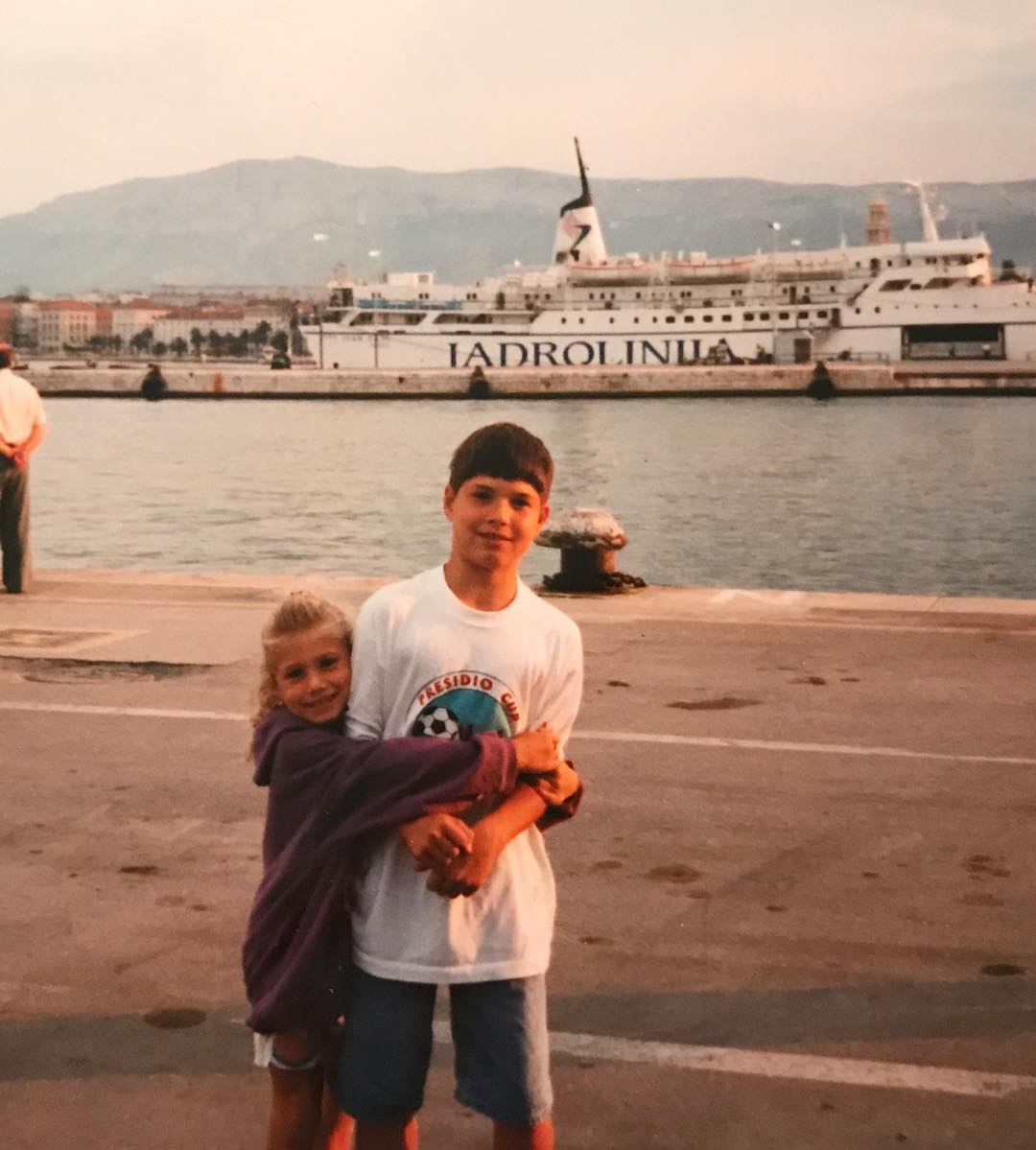
We made our way to Trogir, the town where my grandparents met in their teenage years. My grandfather's family roots are in Trogir, well, technically from a small village in the hills above Trogir called Prapatinica. His family ultimately migrated from the selo to the 'city'. My grandmother's family moved to Trogir from Stari Grad after World War II, which is where one of her brothers continued to live when we visited in 1996. I will never forget eating pršut and sir amongst the chickens in his small outdoor shack.
The memories I can recall most from that trip are with my mother's family in a tiny village outside of Metkovic called 'Kosa'. The seven-house village sits on the river, with two surnames ruling the territory. We are all somehow related.
We stayed at my mother's family home - where my dida and baba raised my mother and her 6 siblings. My mother hadn't seen her family in over a decade, though this absence carried more significance, considering her younger brothers had just fought in the Homeland War. My brother and I spent a lot of time dressing up in their uniforms.
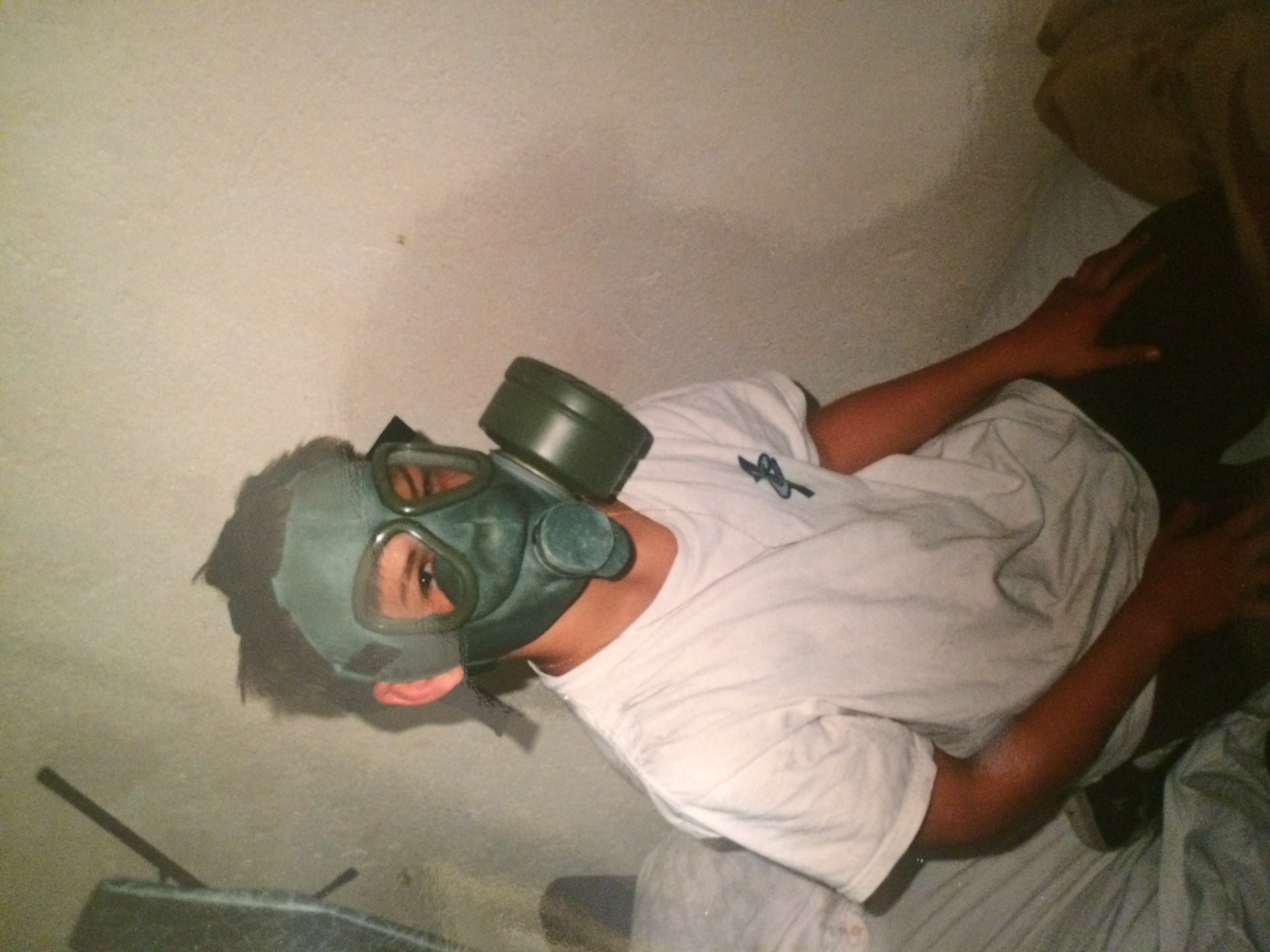
I have home videos of me chewing on crusty white bread, spread with butter and šipak marmalade, as that was my go-to breakfast in Croatia that summer (the sugary cereals of America were quickly forgotten). The few words in Croatian I knew then were endlessly repeated, from 'neću' to 'šta?' and 'jedan, dva triiiii!'.
I remember playing with the other village children on the river, setting out on our small trupina boat to reach the farmland across the way, where my family cultivated their crops to make a living. And the goats - I remember the many baby goats! If only I knew what their fate would be then...
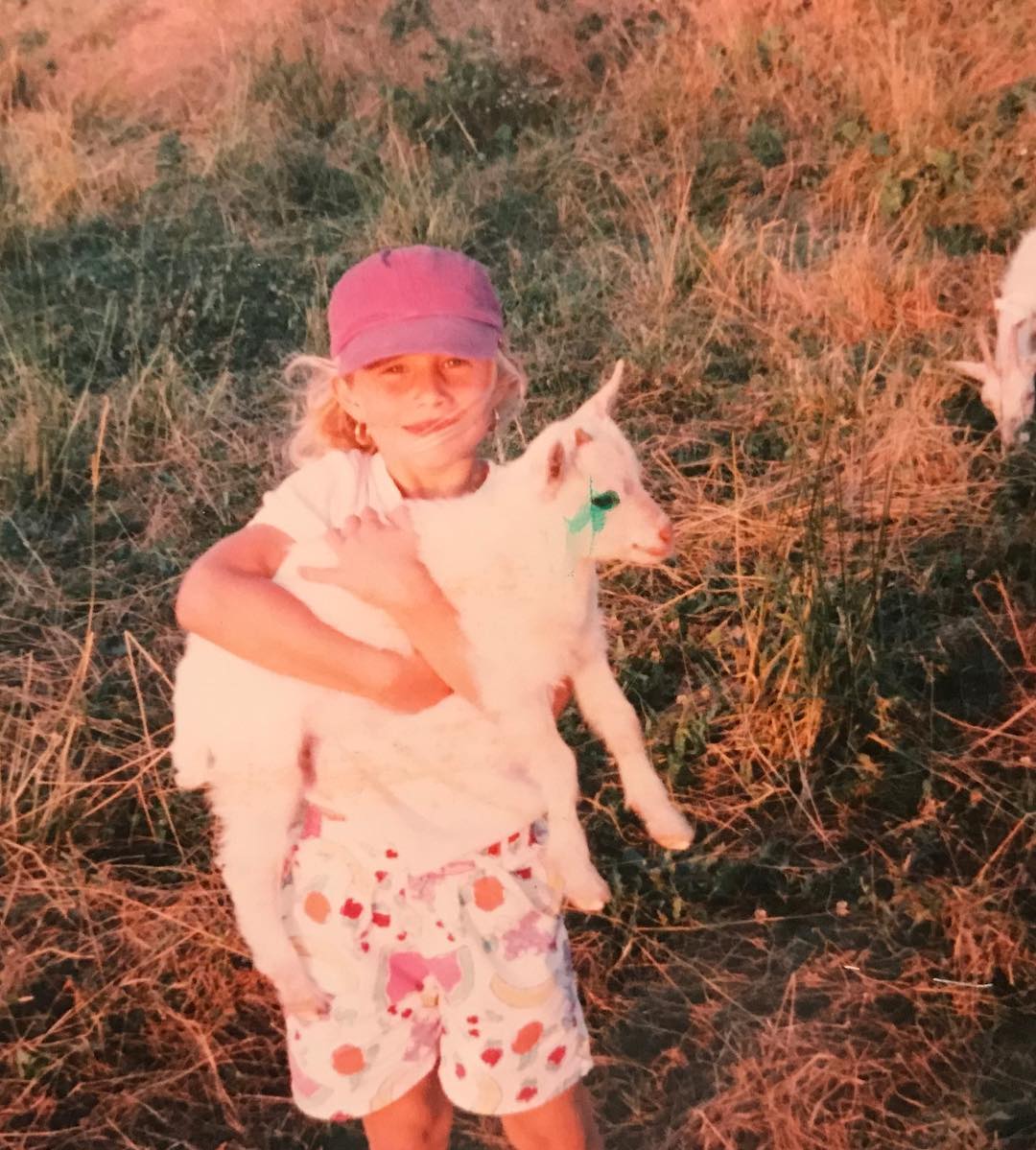
Being from the Neretva River and all, frogs are the ultimate delicacy. And my uncles were experts at hunting them - a unique craft that is done explicitly in the early morning hours. Now, anyone that knows a bit about frog culture in Dalmatia, is that it is usually eaten two ways - in a brudet (and in Neretva, this means stewed with river eel, too), or fried - you now, breaded like schnitzel or fried chicken.
I remember 15 of us huddled around the small family dinner table eating, what I thought, was fried chicken. And as any 5-year-old from America might do, dipping it in ketchup to imitate chicken fingers. I grew suspicious after I glanced over at my father eating the same thing, considering he had been a pescatarian since his early 20s. "Hmm.. If Tata is eating it, it can't be chicken."
And thus, my first experience eating frogs was had, with ketchup, at 5 years old.
I remember swimming at Klek beach, now just a short drive from the new Peljesac Bridge, which is where this famous photo was taken.
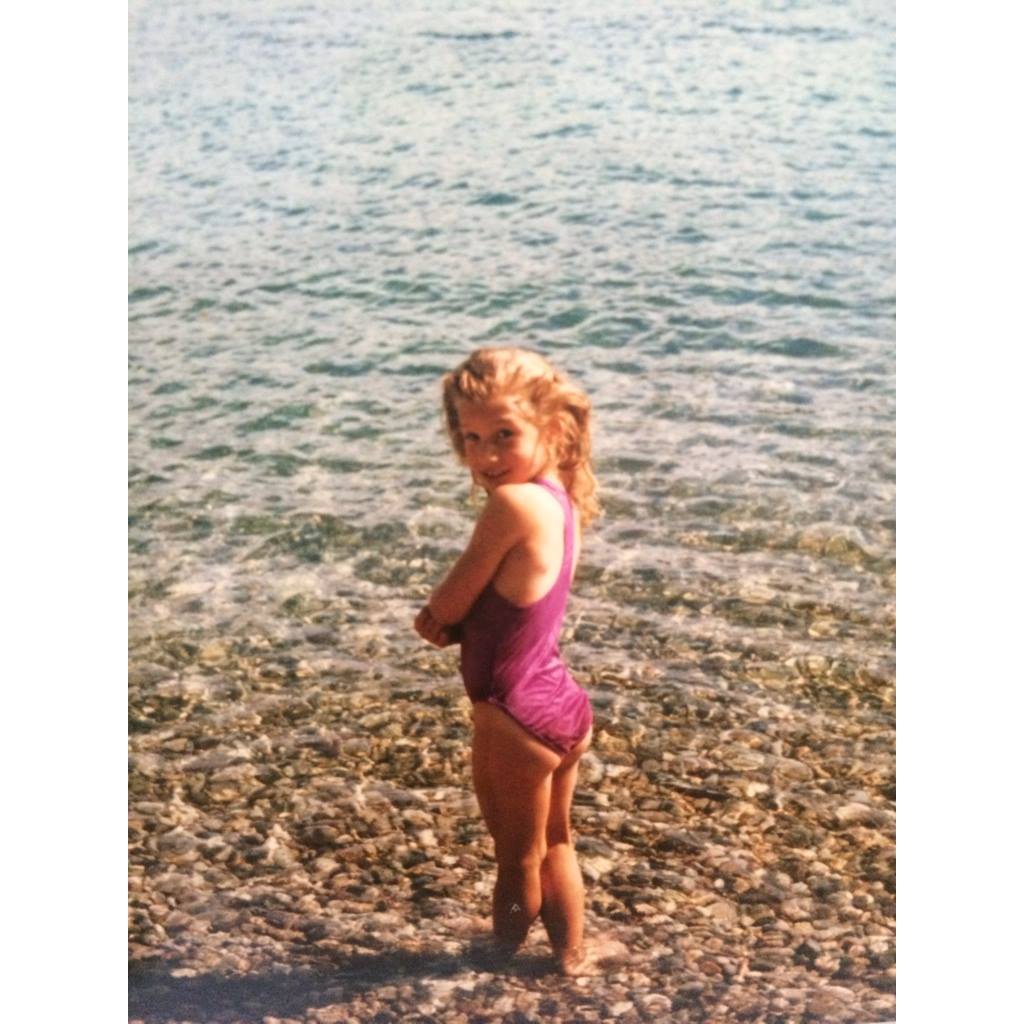
And all I remember about our day trip to Dubrovnik is serving this look on Stradun.
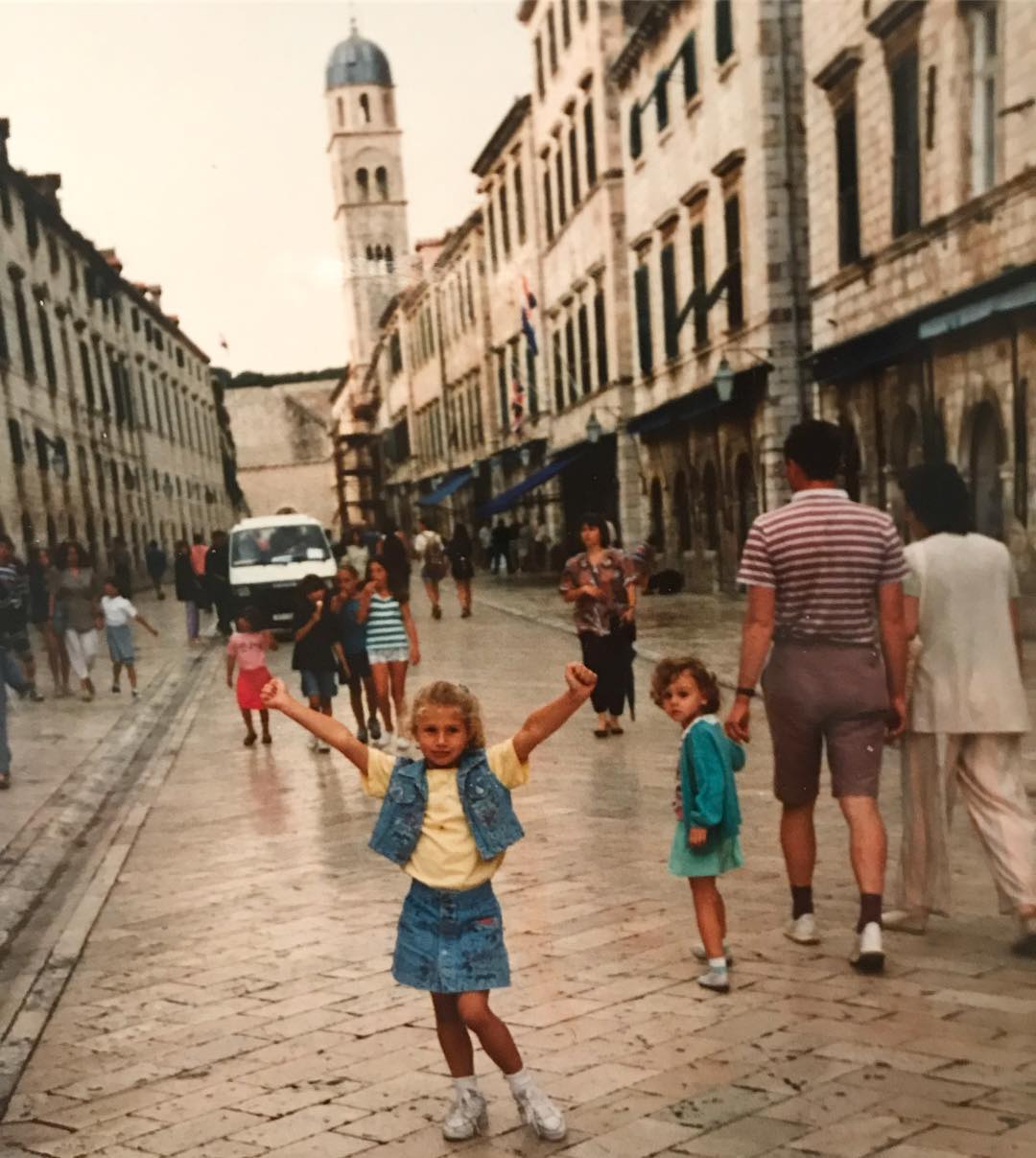
For more, make sure to check out our dedicated lifestyle section.
Croatian Harvest Festival Held in Novi Sad
ZAGREB, 24 July 2022 - The Bunjevci Croats Association (UBH) organised in Novi Sad, Serbia on Sunday a traditional ceremony of thanking God for the harvest and this was the first time it was held outside the northern part of Bačka, a region in the northern Serbian province of Vojvodina.
The two-hour festival, which Bunjevci Croats call Dužijanca, began with Mass and ended with a procession whose participants wore Croatian folk costumes and by giving bread to Novi Sad Deputy Mayor Milan Đurić.
He was thankful for the honour and said the city supported holding the festival in the spirit of good cooperation with the Croatian National Council. Special attention was paid to it as it was held in the year when Novi Sad holds the title of a European Capital of Culture, he added.
UBH director Marinko Piuković said he was glad the association had the opportunity to show without problems the customs the Croatian community in Vojvodina has been cultivating for over 100 years.
He said that two years ago the thanksgiving was held in Zagreb, last year in Hungary, while next year it will be held in Mostar, Bosnia and Herzegovina.
Among those in attendance was Croatian MP Goran Ivanović, who said he hoped the cooperation between minority communities with the majority would be raised to a higher level, specifically by ensuring guaranteed seats in Serbia's representative bodies at all government levels.
Democratic Alliance of Croats in Vojvodina deputy president Goran Kaurić said it was important the Croatian minority's culture could be shown in Novi Sad as it could help ease the renewed tensions in Croatia-Serbia relations.
The festival is co-financed by the Croatian State Office for Croats Outside Croatia, which was represented in Novi Sad by Croatian Ambassador to Serbia Hidajet Biščević.
Bunjevci Croats in northern Bačka celebrate Dužijanca from April to mid-August, when the central event is held in Subotica.
(Hina) ha
71 kg of Food Per Capita Thrown Away in Croatia Every Year
ZAGREB, 24 July 2022 - About 71 kg of food per capita is thrown away in Croatia every year, totalling over 280,000 tonnes, and 76% of that comes from households, while the EU average is 53%, the president of the Food Waste Prevention Centre (CEPOH), Branka Ilakovac, has told Hina.
Prevention and educating citizens has not been recognised in Croatia as key in the fight against the creation of food waste, she said, underlining the importance of expert organisations constantly informing and educating all age groups and sectors.
CEPOH has launched an EU project to build capacities for the Green Deal made to the measure of local communities in order to help everyone who wishes to donate food.
The HRK 442,500 project is mostly financed by the European Social Fund and will last 15 months.
Preventing the creation of food waste is the most important step in food waste management as recommended by the European Commission, Ilakovac said.
It is possible to significantly reduce food waste by educating customers to change daily habits in buying, preparing and consuming food, she said, adding that during the 2020 COVID lockdown, households reduced food waste by 10%.
She said a CEPOH survey showed that nearly half the respondents cited an excess of food prepared as the reason for food waste in their household.
Ilakovac underlined the need to raise awareness of the fact that food waste polluted the air, the soil and underground waters.
Twenty-five percent of habitable areas and 70% of drinking water are used for the world's food production, which is the cause of 30% of greenhouse gases, 80% of deforestation, and one of the major causes of change in land use and biodiversity loss, she said.
That also accelerates climate change, which in turn affects the safety, quality and availability of food, she added.
Throwing food is also a moral problem because of the many socially vulnerable, undernourished and hungry people, whose numbers will only increase due to global inflation and climate change, she said.
According to estimates, EU countries throw away 88 million tonnes of food, causing a cost of €143 billion, she said, adding that Croatia, as an EU member state, set the target of reducing the throwing of food by 50% by 2030, which is also in line with the UN's Sustainable Development Goals.
Ilkovac also said that Croatia had drawn up a 2019-22 plan to prevent and reduce food waste.
For more, check out our lifestyle section.
Croatia's Petra Martić Wins WTA Lausanne Tournament
ZAGREB, 17 July 2022 - Croatia's tennis player Petra Martić on Sunday beat Serbia's Olga Danilović in the final match at the WTA International Ladies Open Lausanne tennis tournament with the result 6-4, 6-2, thus winning the second WTA tournament in her career.
The 31-year-old Croatian captured her first WTA title in Istanbul three years ago.
Martić is the first Croatian winner of the WTA International Ladies Open Lausanne tournament which started in 2016.
The prize money for the winner is $33,200 and Martić also won 280 WTA points.
To read more about sport in Croatia, follow TCN’s dedicated page.
Average Vehicle Age in Croatia at Nearly 15 Years
ZAGREB, 17 July 2022 - The average age of vehicles in Croatia in the first half of 2022 was 14.74 years, and nearly 70% of the vehicles were 10 or more years old, the Croatian Centre for Vehicles reported earlier this week.
In the first six months of this year, there were 1,244,465 registered vehicles in Croatia.
As many as 68.14% of them were 10 or more years old, while 14.73% were between six and nine years old and 12.79% were between two and five years old.
Only 4.33% were up to one year old.
By comparison, the average vehicle age was 14.18 years in 2020 and 14.34 years in 2021.
"Although we hope that this number will fall by the end of the year, the increasing average age of vehicles in Croatia shows the importance of regular vehicle maintenance and technical inspection," said Tomislav Škreblin from the Centre for Vehicles.
Most of the newly-registered vehicles were passenger cars -- 54,429, of which 23,777 were new and 30,652 were used vehicles. 50% of them were powered by diesel and 35% by petrol, while 9.9% were hybrid vehicles.
Only 2.35% were fuelled by petrol and LPG, 1.32% were electric vehicles, 1.11% were hybrid vehicles with external charging, 0.02% were fuelled by petrol and natural gas, and 0.0018% only by natural gas.
Utility vehicles predominantly used diesel fuel as well.
There was a considerable increase in the number of new hybrid passenger cars, accounting for around 21% of the newly-registered vehicles in the first half of 2022. On the other hand, used hybrid passenger cars accounted for only 2.4% of the newly-registered vehicles.
A total of 5,419 hybrid vehicles, 605 hybrid vehicles with external charges and 721 electric vehicles were registered in the first half of the year.
For more news about Croatia, click here.
Minister: Notion of Libertas Entwined in Aesthetics and Spirit of Dubrovnik Festival
ZAGREB, 10 July 2022 - Culture Minister Nina Obuljen Koržinek said on Sunday that the meaning of the word "Libertas" (freedom), which is the motto of the 73rd Dubrovnik Summer Festival, was entwined in the aesthetics and spirit of the festival.
Addressing the special ceremony of the festival's council just before the ceremony of the opening of "Dubrovačke Ljetne Igre" on Sunday evening, the Croatian minister said that the Hymn to Liberty.would be listened to with special emotions and with the thoughts about the developments in Ukraine and Europe.
The 73rd Dubrovnik Summer Festival will open on Sunday, 10 July at 9 p.m. in front of St. Blaise’s Church, with the traditional raising of the Libertas flag to the verses of Ivan Gundulić’s Hymn to Liberty.
Dubrovnik Mayor Mato Franković said that he was proud that two Ukrainian artists would be included in the opening ceremony.
The Festival runs through 25 August.
The drama, music, dance and folklore programmes include over 60 events at a score of venues.
The festival's budget is HRK 9.8 million.
(Hina) ms
Action Plan for Construction and Demolition Waste to be Adopted in Autumn
ZAGREB, 10 July 2022 - An action plan for construction and demolition waste is to be adopted in the autumn, and this has been chosen as a priority for efforts to switch to the circular economy, the head of the sustainable waste management department in Croatia's economy ministry says in an interview with Hina.
The official Sanja Radović has told Hina in the interview published on Sunday that the preparation of the five-year action plan for the circular economy has been supported by the World Bank.
Recently, a committee for the circular economy has been set up.
According to Radović, as much as 70% of the construction and demolition waste can be re-used and recycled.
Construction and demolition waste has been selected as a priority also because of the 2020 devastating earthquakes in Zagreb and Sisak-Moslavina County, which also resulted in higher quantities of building debris.
Construction and demolition waste management is also within the remit of local authorities that are supposed to introduce an organised system.
The units of local authorities are supposed to determine drop-off locations where construction and demolition debris can be disposed and choose waste sorting and recycling tools for that purpose.
Sorted construction waste can be reused in the construction industry.
In the quake-hit Banovina area in Sisak-Moslavina County this process is already applied, and the City of Zagreb is expected to start doing that in the autumn.
Currently, Croatia sorts out 35% of all the waste, said Radović.
The aim of the circular economy is to reduce the quantity of non-recycled waste to the lowest possible level.
(Hina) ms
Ecofin to Make Final Decision on Croatia's Entry into Euro Area on Tuesday
ZAGREB, 10 July 2022 - The Economic and Financial Affairs Council for EU (Ecofin) convenes on Tuesday to adopt the final three legal acts which will enable Croatia to introduce euro as its currency on 1 January 2023.
One of those three acts concern the decision on the adoption of the euro by Croatia.
Also the amendment will be adopted to the provision whereby the 19-member euro area will welcome Croatia as its 20th member. Currently the euro area has more than 340 million inhabitants and is the second strongest economy globally. The euro zone accounts for 15% of the global GDP.
And, the third legal act concerns the fixing of the conversion rate of the kuna for the euro.
The outgoing minister Zdravko Marić will attend the Ecofin meeting in Brussels for the last time in his capacity as the Croatian minister of finance after he recently resigned from the government.
Deeper integration
Entering the euro area is one of the remaining two strategic goals for Croatia's deeper integration in the European Union. The other goal is the country's admission to the passport-free Schengen Area, and the decision to this effect is likely to be adopted in September.
As a result, Croatia is to complete its deeper integration into the EU in 2023, ten years after it joined the European Union.
Croatia's fulfillment of all convergence criteria for euro area
On 16 June 2022, the Eurogroup endorsed the positive convergence assessment of Croatia, agreeing that Croatia has fulfilled all convergence criteria required to join the euro area, proposing that Croatia should introduce the euro on 1 January 2023.
The Eurogroup's move ensued after on 1 June both the European Commission and the European Central Bank (ECB) issued the convergence reports informing the EU Council about the progress made by Member States towards achieving the criteria for joining the euro area.
One of the four criteria is price stability.
Furthermore, the aspirant is expected to have sound and sustainable public finances which means that the country should not be under the excessive deficit procedure.
Also, exchange-rate stability is one of the criteria and under this criterion the country has to participate in the Exchange Rate Mechanism (ERM II) for at least two years, without strong deviations from the ERM II central rate and without devaluing its currency's bilateral central rate against the euro in the same period.
And finally, long-term interest rates are included in the criteria, which should not be higher than two percentage points above the rate of the three best-performing member states in terms of price stability.
In both reports on 1 June, Croatia received a very favourable assessment: not only did Croatia meet all the criteria, but the sustainability of its convergence has been assessed more favourably by the ECB than in its 2020 report and much more favourably than in its earlier reports.
The reports highlight that the Croatian legislation is compatible with the EU Treaties and the Statute of the European System of Central Banks and of the European Central Bank.
Croatia was assessed more closely than the other countries under review, given the fact that the Croatian authorities have announced their intention to adopt the euro as of 1 January 2023.
HNB enters Eurosystem, monetary authority of euro area
Croatia's entry into the euro area also means that the Croatian National Bank (HNB) enters the Eurosystem, which comprises the European Central Bank (ECB) and the national central banks of the Member States whose currency is the euro.
The Eurosystem is the monetary authority of the euro area with its primary objective being the maintenance of price stability for the common good. Acting also as a leading financial authority, the Eurosystem aims to safeguard financial stability and promote European financial integration.
The ECB has the central role in the Eurosystem, and the main body of the ECB is its six-member Executive Board which consists of the President, the Vice-President and four other members. All members are appointed by the European Council, acting by a qualified majority.
The ECB Governing Council is the main decision-making body of the ECB. It consists of the six members of the Executive Board, plus the governors of the national central banks of the euro area countries.
Dual price display
In September, the four months prior to the switching to the euro, the obligation of dual price display both in national currency (kuna) and the euro goes into effect in Croatia.
The two-week period of dual circulation of both currencies will run as of 1 January.
Coins produced in Croatia
Euro banknotes are taken from the ECB, while euro coins will be produced in Croatia. Euro banknotes are identical in all the euro zone's members, while the euro coins have national sides with national symbols.
There are eight euro coin denominations, ranging from one cent to two euros.
Concerning Croatia's symbols, all coins will have the Croatian chequerboard in the
background.
The coin of 2 euro also includes Croatia's map, the coin of 1 euro has the motif of marten, 10c, 20c and 50c coins have the motif of researcher Nikola Tesla, while 1c, 2c, and 5c coins have the HR letters written in the Glagolitic script.
Coins with the Croatian national side can start to be minted once the Council of the EU adopts a decision on the introduction of the euro in the Republic of Croatia.
(Hina) ms
Conference on Cross-Border Cooperation Between Croatia and Bosnia and Herzegovina Held in Osijek
ZAGREB, 8 July 2022 - A Bosnia and Herzegovina-Croatia cross-border conference was held on Friday in Osijek on how to enhance the regional cooperation of Croats from Bosnia and Herzegovina with Croatia.
This is a project aimed at improving regional cooperation and exchange of experiences in the implementation of cross-border projects, which the Development Agency in Žepče, central Bosnia, is implementing in partnership with the County Development Agency of Osijek-Baranja County and 11 local self-governments in Bosnia and Herzegovina areas predominantly populated by Croats.
The director of the Žepče Development Agency, Branka Janko, underscored that the agency has been operating since 2010, and so far they have implemented three cross-border projects, which are mainly related to the competitiveness of the economy and the development of rural areas.
Every new acquaintance with regional agencies in Croatia is useful to us, and our goal, considering that it is mostly about rural areas, is to raise them to a higher level of development using EU funds, which will be opened for Bosnia and Herzegovina, said Janko, adding that they are interested in economy, tourism and renewable energy sources.
Žepče Municipality realised long ago that municipal budgets were not sufficient for faster development, said Mayor Mato Zovko and added that tit was a success when, as a small municipality, they managed to implement the third cross-border cooperation project - Croatia, Bosnia and Herzegovina and Montenegro. These projects range from €600,000 to 1 million and 75% is financed by the EU.
We have strengthened the Development Agency so much and can hardly wait for Bosnia and Herzegovina to receive EU candidate status. With our example, we have shown other municipalities what it's like to be ready for the future, said Zovko.
Osijek-Baranja Deputy County Prefect Josip Miletić, spoke about the exceptional importance of cross-border cooperation with Bosnia and Herzegovina, stating that the county had previously recognised the needs of Croats outside of Croatia directly with the means of the county.
With our example and logistics, we will help them to submit quality projects and receive these funds, and we will continue to provide support to Croats regardless of cross-border cooperation, said Miletić.
The director of the Osijek-Baranja County Development Agency, Denis Ćosić, announced that experts from Croatian agencies will go to BiH to train their employees, who will work on project proposals and their implementation.
Our goal is to create not only a knowledge base, but also to present project proposals that could be submitted through other tenders, through the Ministry of Regional Development and the Central State Office for Croats Abroad, he said.
Living as a Croatian in South Africa: Part One - Introducing Ova Klapa
June 28, 2022 - In a new TCN series, intern Adriana Tasovac talks about living as a Croatian in South Africa.
My earliest memories of my childhood are with mixed feelings. Although my childhood within my family and Croatian community was very joyful and content, it was difficult for me initially to blend in with my South African peers at school, as they were all English speaking and I had only spoken Croatian until the age of two. Children can be brutal and unfiltered and most unaccepting of someone that does not blend in with their norm, which is what I was, with my unpronounceable name and lack of common language. Today as an adult I can laugh off the awkward childhood as my upbringing within my Croatian community as a Luška (Female from Vela Luka) is what stirred up my strong feelings and absolute love of my roots and rich heritage and culture. Living as a Croatian in South Africa has been a very positive experience, which has taught me the importance of embracing other heritages, cultures, and countries, and the significance of loving who you are.
Velo Lučani (Croatians from Vela Luka), are bound by a common love for singing and acapella choirs. Gathering with our friends and family, was always a frequent occurrence. Every opportunity was taken at any given time, to get together where much eating, drinking, and singing took place. Upholding the traditions from home seemed to fill the void of living in a foreign country. It was these joyous get-togethers that prompted a group of close-knit Lučani friends, including my father to start their singing journey.
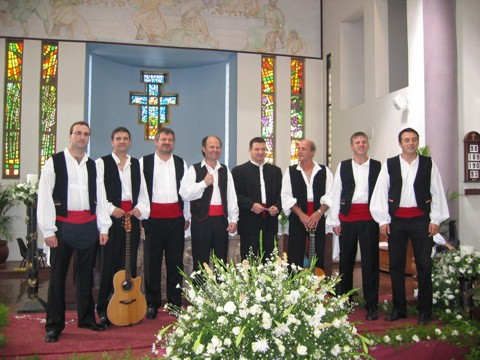
Soon after, they gave their group a name, and "Ova Klapa” (This Acapella) was born. Ova Klapa ignited my interest in music, particularly our traditional folk music. The klapa (acapella group) would sing traditional folk songs after dinners during our many gatherings, which in turn prompted them to record a compilation of their favourite and most revered songs in an album.
One very fond memory has always remained with me, Ova Klapa’s introduction of themselves and their complete cover album ‘’Jo, Da Mi Je” (Oh, How I Wish), as well as some teaser songs from their then-upcoming, second cover album, to the South African- Croatian community at the Saint Jerome Croatian Catholic Church in Johannesburg.
(Part 1)
A memorable concert was organised and performed on the evening of the 28th of February 2004, which told the story of their love for Vela Luka and their longing to return someday.
(Part 2)
This nostalgic and emotional event showcased a variety of songs from their cover album as well as their appreciation of South Africa, by including a native South African choir to perform some of their own traditional dances and recitals. There were many laughs and tears throughout the journey of the tale that they told, and the concert concluded with their rendition of ‘’Sjećanje na Velu Luku’’ (Remembering Vela Luka).
I recall waiting patiently all night for my big moment to arrive. All the children of the members of Ova Klapa, were dressed in traditional outfits and given the task of presenting all the ladies and benefactors with a bouquet of flowers. I proudly executed my duty and then spent the finale in my father’s arms gazing into the audience. “Vela Luku, mala, ne zaboravi!” (Little Vela Luka, I won’t forget you!).
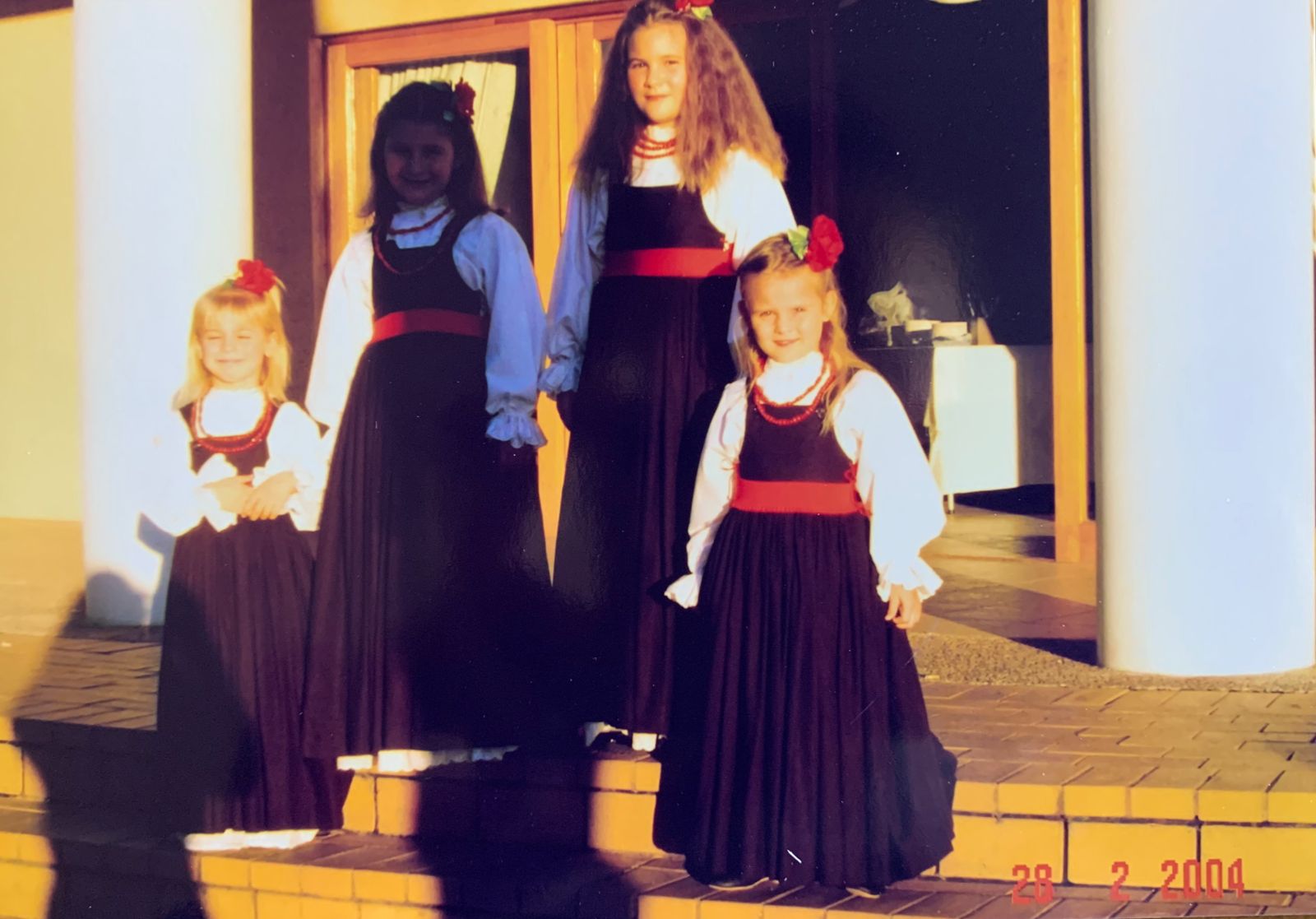
For more, check out our lifestyle section.


